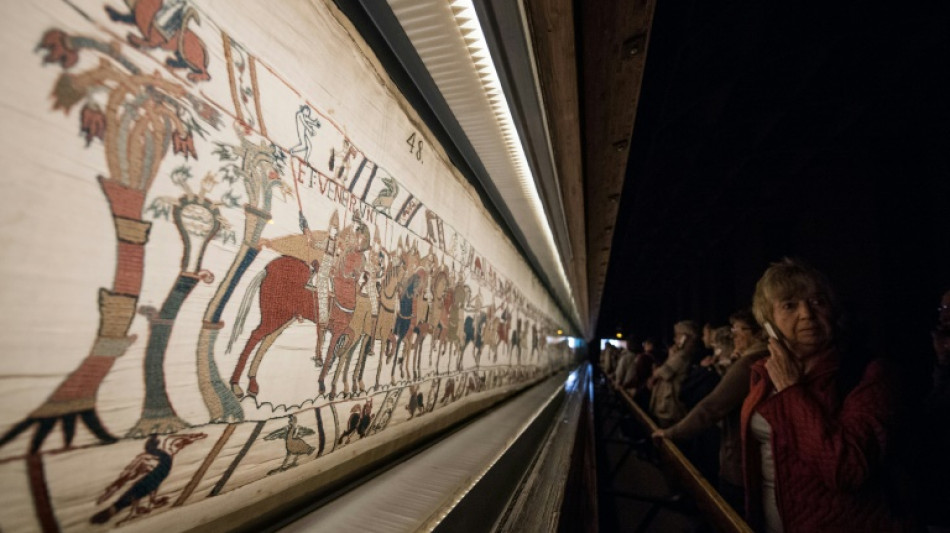

French fear diplomatic stitch-up over Bayeux Tapestry loan
French President Emmanuel Macron's promise to loan the Bayeux Tapestry to the United Kingdom in a diplomatic gesture has caused an outcry in the French art world given the ancient fabric's fragile state.
The 11th-century embroidery depicts the Norman conquest of England in 1066 and was added to UNESCO's "Memory of the World" register in 2007.
In July, Macron promised to loan the tapestry to the British Museum in London in September 2026 as a way to "revive cultural relations" between France and the UK.
His pledge came despite warnings about how to transport the ancient masterpiece from its museum in northern France.
Since 2020, experts have meticulously documented 24,204 stains, 9,646 holes and 30 tears in the 70-metre long (230 feet), 50-centimetre high (20 inches) tapestry.
They warn that any journey "longer than one hour" would subject it to "additional risks".
"The tapestry is extremely fragile and worn," Aude Radosevic Mansouri, who led a seven-person restoration team to assess its condition in 2020 and 2021, told AFP.
"When you look at it really up close, you can see right through it. You don't even want to handle it in case it falls apart in your hands," she said.
Until recently, state bodies have heeded warnings.
In 2021, Normandy's regional cultural affairs body (DRAC) told AFP that "it was not possible to transport the work before restoring it".
A two-year renovation project was meant to begin in 2025 but was postponed indefinitely this year and the relic will instead be taken off display while the museum currently housing it undergoes renovations of its own.
- 'Pact of silence' -
In a Youtube video posted by regional authorities early 2025, a DRAC heritage advisor said the tapestry was "too fragile to be moved long distances" mainly due to the vibrations caused by transportation.
But the video was deleted after Macron's announcement in July.
Since then, institutional voices have since gone silent -- neither the Bayeux museum, DRAC nor the town council have responded to AFP's requests for comment.
"It feels like there is a pact of silence," a source close to the issue who requested anonymity told AFP.
Another anonymous source working in the art restoration sector said she was "astonished" that Bayeux Tapestry experts had been "swept aside in favour of diplomatic considerations".
Her disbelief is shared by more than 71,000 people who signed a petition that dubs the loan a "heritage crime".
"To risk destroying such a unique masterpiece is unacceptable," said petition author Didier Rykner, who is editor-in-chief of the online news site La Tribune de l'Art.
"Any damage done would be irreversible," Aude Radosevic Mansouri warned.
Philippe Bélaval, the Elysee official overseeing the loan, is unperturbed by the backlash.
"It is my job to ensure that the tapestry can be transported without problems in order to be enjoyed by the British public and appreciated abroad," he told AFP.
The senior civil servant pointed to a 2025 study, conducted by the culture ministry, that lists precautions to take when transporting the tapestry long distances.
"An eventual loan to Britain was already under discussion back then," he said.
The culture ministry did not respond to AFP's request for more information about the confidential study.
The loan is set to go ahead despite opposition.
A call for tenders has just been issued to carry out a "dry run" to the UK and test "anti-vibration solutions", following earlier studies that focused on relocations of about 100 metres in order to renovate the tapestry.
But according to one of the professionals AFP spoke to, "there are no risk-free solutions".
G.Loibl--MP




